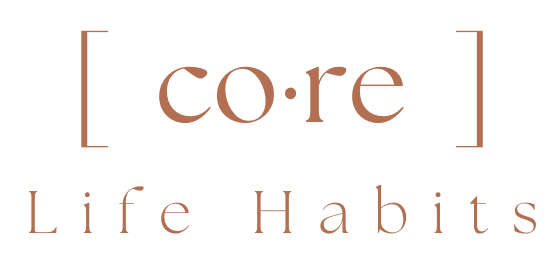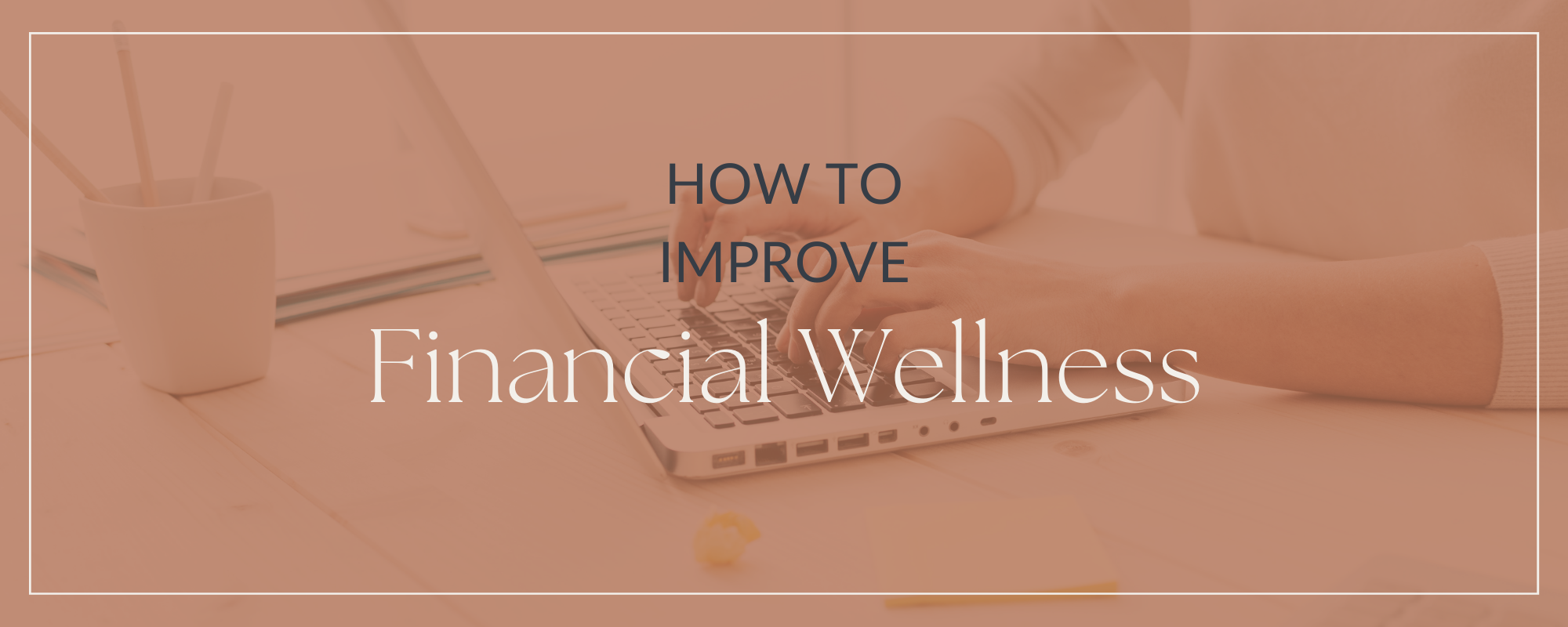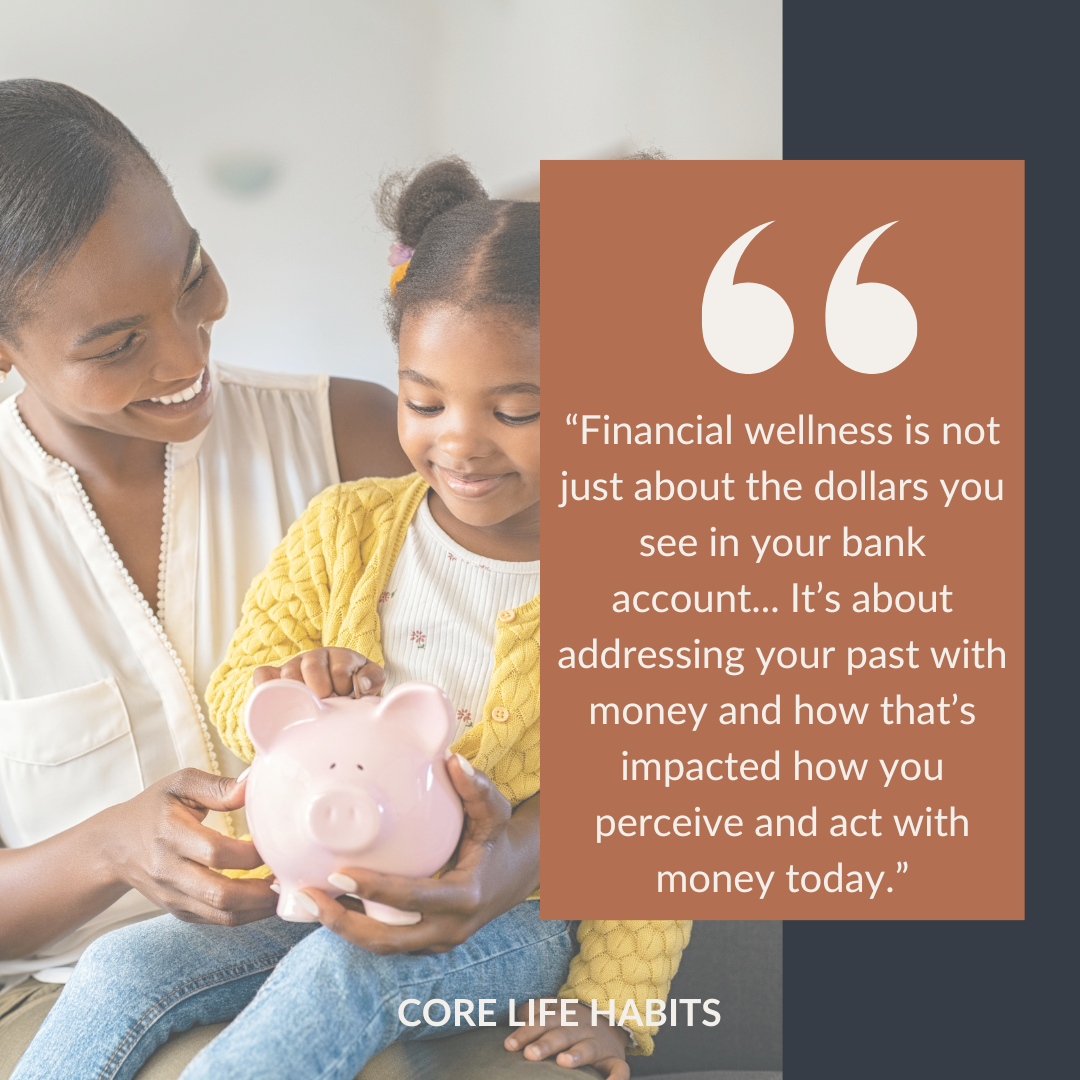How to Improve Financial Wellness
A lot of times when we think of the word “Wellness” and associate it with self-care, nutrition, exercise, and living a healthy lifestyle for our mind and bodies. What I also think should be included with that word is how we live and manage our money. The state of our finances can significantly impact not only our bank accounts but our physical, mental, and emotional health as well. It's easy to feel overwhelmed and confused about various aspects of our finances. And making financial decisions can be a headache sometimes! The majority of people in the U.S. actually find money to be one of their top stressors. So let’s dive in to see how we can change this!
My hope today for this post is to delve into the realm of what financial wellness means, and explore practical tips to enhance it!
Financial Wellness Tips
I feel like the word “wellness” gets tossed around a lot these days. Do you? One definition said wellness means this: “the act of practicing healthy habits on a daily basis to attain better physical and mental health outcomes, so that instead of just surviving, you're thriving”. Achieving financial wellness requires a combination of smart planning and disciplined habits to put you in a thriving position vs. a surviving one. What stands out to me is how it’s a daily practice. These aren’t quick fix solutions here, but a lifestyle you build and live out with your finances! Let's explore some actionable tips that can make a substantial difference in your financial health. Here they are!
Create and Track your Spending on a Budget
Strategically and Quickly Pay down your Debt
Evaluate your Spending Habits
Set and Forget your Savings
Build an Emergency Fund
Invest Early and Consistently
Be a Team Player
Realize the impacts of money on your health health
If you have kids, talk to them about money!
Let’s dive into the details behind each of these!
How to Improve your Financial Wellness
Create and Track your Spending on a Budget
This tip is always my #1 in ANY blog post or coaching session with clients. Creating and tracking along to a monthly budget is a cornerstone of financial wellness. Not only do you need to allocate specific amounts of money to essential expenses, savings, and discretionary spending, but you also need to ensure you’re allocating your time to really sit down, create your plan, ensure it’s realistic and in line with your goals, and update several times throughout the month. This ensures that you have a clear overview of where your money is going vs. wondering where it went.
Need some more support on how to set up a successful budget? Check out this resource I’ve got for you here!
Strategically and Quickly Pay down your Debt
You all know me and know how I am not a fan of debt! Debt robs you of your income every single month keeping you away from saving or investing in your future. Paying down your debt will free you up of hundreds or even thousands of dollars of minimum payments and allow you to keep that money in your pocket. This approach minimizes the long-term financial burden and gives you the power and ability to prepare for your future. Whether it's a student loan or credit card debt, a strategic debt reduction plan is key to achieving financial wellness. It’s time to focus more on your Net Worth Score vs. your Credit Score!
PRO TIP: I recommend utilizing the Snowball method (smallest to largest balance) over the Avalanche Method (high interest rate to low interest rate) when paying down debt. It’s not about the math but more about the psychology of eliminating debts off your list quickly. Mathematically, there usually isn’t a HUGE difference in the pace in which you’ll pay it off, BUT a stronger likelihood that you’ll stick to the snowball method due to seeing results quicker!
Evaluate your Spending Habits
As you start tracking along with your budget, and paying off your debt, it’s time to evaluate where you’re spending money. Even if you’re tracking where your money is going and freeing yourself up from your debt, we can still easily spend our money quicker than we think, and sometimes defeat the purpose of these first two steps! Whether it’s a fixed expense OR a variable one, ask yourself if it’s really necessary, worth the amount spent, or if there’s a way you can save. Maybe you find money that can go towards speeding up your debt elimination, or save on those subscriptions that you aren’t using.
No matter what, you should feel that you’re spending money on things you value, that are serving a purpose, and that you don’t feel that money is being wasted. There’s nothing worse than feeling like the money you worked hard to earn just got thrown away. Purposeful and intentional spending is where it’s at!
Set and Forget your Savings
Saving money can be easier if we follow through with this one simple tip! Setting up automatic transfers from your checking account to your savings account is one of the best things you can do for your financial wellness. Many people come to me struggling to save because it’s last on their to-do list of things they do with their money. First, cover the bills. Then, spend. And if there’s anything left (which, is there ever?), I’ll save. Versus, if you save FIRST, your lifestyle can be built around that. Many people I know don’t lack the money to save, they just don’t have a purposeful savings plan in place. It's a simple yet powerful way to build your emergency fund, save for that next vacation, car repair, or Christmas gifts for the next season!
Build an Emergency Fund
On the topic of saving, having emergency savings is such an essential part to anyone’s financial well-being! Life is unpredictable, and unexpected expenses can arise at any moment. Your emergency fund is your safety net, providing peace of mind and the resources you need during challenging times like job loss or health emergencies. Aim to save at least six months' worth of living expenses in your emergency fund.
Pro Tip: Do not place this money in the stock market. We don’t want ANY risk associated with potentially losing any part of your emergency fund. We can put other money there. Instead, park this money in a money market account or high yield savings account where you can earn more than your bank savings account but not risk your protection plan.
Invest Early and Consistently
I am ALL about getting started early with your investments and contributing consistently to these! While the earlier the better here, I do still recommend paying off all consumer debt and having an emergency fund in place as a foundation before starting here. We need to be prepared right away when that emergency comes with cash on hand and paying off our debt gives us the cash to save up for this + our investments.
Once these two steps are done, it’s time to start planning for your future ASAP by contributing to retirement accounts (I encourage 15% of your gross pay), saving for your kids (college or general future savings), and additional investments (i.e. early retirement) . There are SO many options out there for each of these, it’s important to learn more about the logistics of how they work and which are the most beneficial for you. I discuss these options quite often throughout my Financial Coaching experience with clients!
Whichever you find fits you best, taking advantage of these accounts allows your money to grow exponentially over time, thanks to compound interest. Consistent contributions to your investment accounts help you build the future of your dreams!
Be a Team Player
This is one of the most important tips for everyone’s financial well-being. It’s time to ensure you two are on the same team! If you’re not communicating together about your finances, this can lead to some sticky situations quickly! If you signed up to be partners for life, communicate, plan together, and work towards goals together. Y’all are one unit! Working together towards your financial wellness only projects you forward faster and brings more peace, ease, and harmony in this part of your relationship.
Through my coaching experience, I’ve seen first hand how complicated and tricky it can be to work together on your finances as partners. Many of my clients who have gone through my coaching experience have found so much more peace and harmony about their relationship as a whole as they work together! Let’s talk more about how we can strengthen your finances and your marriage at the same time. :)
Realize the Impact Money has on your health
Money can have more of an impact beyond just seeing the numbers change in your bank account. Notice how money has impacted your mental, physical and emotional well-being. Are you working a crazy amount of hours just to get by, and it's impacting your physical health? How about how you feel about money and your personal finances? What emotions arise when you think about money and your situation? Addressing the mental and emotional aspects of money can be the pivotal moment for you and your financial situation!
If you have children, talk to them about money!
This one could probably be the most important on this list. Just about everyone I’ve worked with has expressed challenges or trauma’s with money from their childhood. How money was managed, and perceived in their house deeply influences how you see, perceive, and think about money. It paints an image in our minds of what we believe about money and can even get tied into our identities. I hear things like “we didn’t have much growing up”, or “I always saw my parents stressing or arguing about money”. What our kids see on this topic gets imprinted so deeply and quickly!
If you have children, it is beyond important not only to have conversations with them about money, but to teach them what it’s purpose is, how it works, and create an open and peaceful environment when talking about it. Ensuring our kids feel safe and secure is huge along with teaching them the reality of how money works. This does not mean you need to tell them all your stress around money if they’re 5! HOWEVER. Teaching them by starting with the simple concepts like a good ol’ lemonade stand, or doing chores and saving up so you can take them to the store to buy a toy they’ve had their eyes on. Of course, each age group requires different needs. But overall, communication is KEY!
Why is Financial Wellness Important?
Financial wellness is not just about the dollars you see in your bank account; it's about having a healthy relationship with giving, saving and spending. It’s about working as a team with your partner. It’s about addressing your past with money and how that’s impacted how you perceive and act with money today. There is a lot more tied to money than just numbers and spreadsheets!
Financial Wellness is about addressing the numbers on paper AND how it impacts your physical, mental, and emotional well-being. It’s about creating plans AND about being a stronger communicator and team player. It’s about having a plan that allows you to build wealth for a future you’ll love AND finding a way to have fun along the way.
By implementing these tips and understanding the importance of financial well-being, you're taking significant steps towards a healthier and happier life. Remember, it's never too late to start making positive changes in your financial journey. If you want someone to walk alongside you in kick starting this journey and help you frame out your short and long term and financial goals, I’ve got you! Apply to the Financial Coaching experience so you can build a healthy lifestyle with money!





